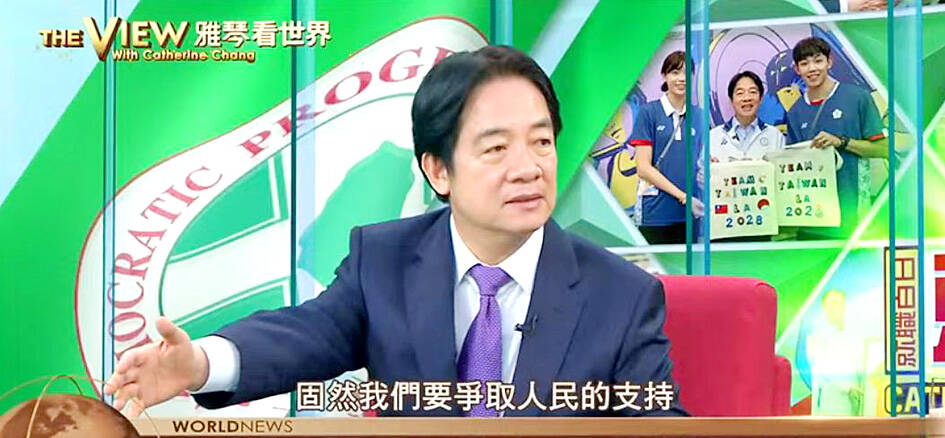China’s ambition to annex Taiwan is based on a desire to change the rules-based international order, rather than a desire for territorial gains, President William Lai (賴清德) said in an interview.
During an appearance on the talk show The View With Catherine Chang, aired last night, Lai said China aimed to achieve hegemony, and that peace and stability in the Taiwan Strait was an issue of worldwide concern.
During the interview, Lai also discussed his “four-pillar plan” for peace and prosperity, which he first outlined in an article published by the Wall Street Journal on July 4 last year. That plan includes bolstering Taiwan’s military deterrence, treating economic security as national security, developing partnerships with other democracies, and maintaining steady and principled leadership on cross-strait issues.

Photo: Screengrab from CH50’s YouTube channel
Lai cited recent expressions of support for Taiwan from the international community, including those from Japanese Prime Minister Fumio Kishida, US President Joe Biden, US Secretary of State Antony Blinken and the leaders of some EU countries, as well as statements made during the G7 summit in June.
Those statements all said that “maintaining peace and stability across the Taiwan Strait is indispensable to international security and prosperity,” Lai said, adding that they illustrated the need for Taiwan to “stand united with the international democratic camp.”
On the issue of economic resilience, Lai said that only 11.4 percent of Taiwan’s overseas investments last year were in China, down significantly from 83.8 percent in 2010.
Taiwanese businesses are dispersing those investments elsewhere including Japan, the US, Europe and Southeast Asia, he said.
Commenting on regional security alliances, Lai cited the establishment of the Quadrilateral Security Dialogue, the AUKUS security partnership, the Five Eyes alliance and the US-Japan-Philippines summit, which he said showed that democracies are cooperating near the Taiwan Strait.
Responding to rumors that Washington was concerned about Lai lacking diplomatic experience, and that it did not want him to transit through the continental US, Lai denied them and said that he did not have any plans to visit the US in the immediate future.
A White House official also dispelled rumors about US concerns about Lai’s administration during a news conference on Aug. 23.
“Everything that we have seen come out of Taipei indicates that the current leadership remains committed to maintaining status quo, and peace and stability,” the official said.

Auckland rang in 2026 with a downtown fireworks display launched from New Zealand’s tallest structure, Sky Tower, making it the first major city to greet the new year at a celebration dampened by rain, while crowds in Taipei braved the elements to watch Taipei 101’s display. South Pacific countries are the first to bid farewell to 2025. Clocks struck midnight in Auckland, with a population of 1.7 million, 18 hours before the famous ball was to drop in New York’s Times Square. The five-minute display involved 3,500 fireworks launched from the 240m Sky Tower. Smaller community events were canceled across New Zealand’s

The Ministry of Foreign Affairs (MOFA) yesterday said it is closely monitoring developments in Venezuela, and would continue to cooperate with democratic allies and work together for regional and global security, stability, and prosperity. The remarks came after the US on Saturday launched a series of airstrikes in Venezuela and kidnapped Venezuelan President Nicolas Maduro, who was later flown to New York along with his wife. The pair face US charges related to drug trafficking and alleged cooperation with gangs designated as terrorist organizations. Maduro has denied the allegations. The ministry said that it is closely monitoring the political and economic situation

‘SLICING METHOD’: In the event of a blockade, the China Coast Guard would intercept Taiwanese ships while its navy would seek to deter foreign intervention China’s military drills around Taiwan this week signaled potential strategies to cut the nation off from energy supplies and foreign military assistance, a US think tank report said. The Chinese People’s Liberation Army (PLA) conducted what it called “Justice Mission 2025” exercises from Monday to Tuesday in five maritime zones and airspace around Taiwan, calling them a warning to “Taiwanese independence” forces. In a report released on Wednesday, the Institute for the Study of War said the exercises effectively simulated blocking shipping routes to major port cities, including Kaohsiung, Keelung and Hualien. Taiwan would be highly vulnerable under such a blockade, because it

UNRELENTING: China attempted cyberattacks on Taiwan’s critical infrastructure 2.63 million times per day last year, up from 1.23 million in 2023, the NSB said China’s cyberarmy has long engaged in cyberattacks against Taiwan’s critical infrastructure, employing diverse and evolving tactics, the National Security Bureau (NSB) said yesterday, adding that cyberattacks on critical energy infrastructure last year increased 10-fold compared with the previous year. The NSB yesterday released a report titled Analysis on China’s Cyber Threats to Taiwan’s Critical Infrastructure in 2025, outlining the number of cyberattacks, major tactics and hacker groups. Taiwan’s national intelligence community identified a large number of cybersecurity incidents last year, the bureau said in a statement. China’s cyberarmy last year launched an average of 2.63 million intrusion attempts per day targeting Taiwan’s critical